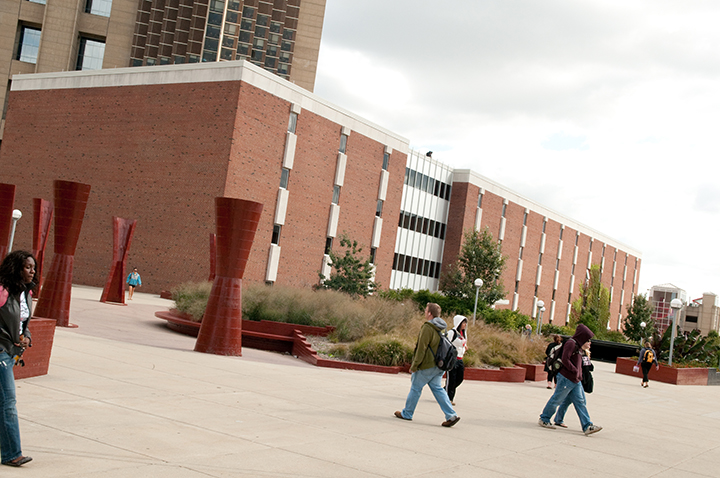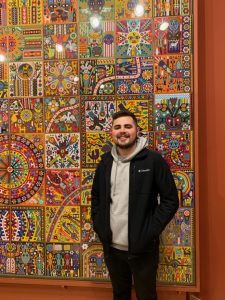Victor Brito is a senior Redbird from Crystal Lake. Both of his parents are from Las Vueltas, a small town in Mexico. Where his parents come from means a lot to him because it makes up an essential part of who he is. Brito loves to listen to music and play soccer. He enjoys spending time with his family, his time on campus and visiting back home. The Latin American and Latino/a Studies (LALS) Program took a minute to catch up with Brito and speak with him about his Illinois State experience.
What is your favorite quote?
My favorite quote is from Ernesto “Che” Guevara: “Viva la Revolucion.” I really love this quote because it reminds me of a united Latino America. It shows great pride and strength in our people. This reminds me of the struggles that my parents went through to get to this country and give my sister and me a better life.
Are you involved in any registered student organizations? If yes, what are you involved in and what is your current role?
I am part of two organizations on campus, the first one is a Multicultural Co-Ed fraternity on campus called Alpha Psi Lambda. I am currently the community service chair. My role includes overseeing all the community service we do and organizing events to give back to the community. I am also an active member of ALPFA which is the Association of Latino Professionals for America. Both of these organizations have given me a place where I can be proud to be a Latinx student on this campus and have helped me gain organizational, leadership, and business skills. I am grateful for that.
What is your major and what year of school are you in?
I am a sociology major here on campus and I am senior. I am also an urban studies minor. This has also helped me grow as a student because I got to learn more about urban areas and how they function. Sociology has taught me so much about how the world works and how we understand society and do research about it.
What inspired you to declare the Latin American and Latino/a studies minor?
What made me declare the Latino/a Studies minor here at Illinois State was that I was looking for a place where I could learn more about what it means to be Latino. I wanted to learn more about history and how my culture was similar to others. I was also inspired to take this minor because I knew it was different from a Spanish minor. I knew I was going to dive in and be able to get my hands dirty with research and readings about what it means to be Latino.
In what ways has declaring a Latin American and Latino/a studies minor complimented your studies? Would you recommend this plan of study to other students?
This minor opened my eyes to so many things I had never thought about. I have learned about things such as how popular Spanish music has become popular and its roots. How some instruments trace back to African roots. I have learned about what it means to be Afro-Latino and the complexities that come with it. I have learned how neighborhoods in big urban areas are classified as Latino ones, such as Humboldt Park representing a large Puerto Rican population and Little Village representing a large Mexican population in Chicago. I would definitely recommend this minor to other students because you learn more about the history and culture aspect of Latino. I was able to make personal connections to the topics discussed in the minor and relate it back to my roots with my family and analyze it.
Have you had the opportunity to study abroad? If yes, how has your Latin American and Latino/a studies minor impacted your experience?
I have not had the opportunity to study abroad but I go to Mexico to visit my family there and it is always an amazing feeling. To go back and connect with my culture on a different level. I know I will always have a home there and will always have family there that care for me.
Have you attended any Latin American and Latino/a Studies Program events? If yes, what was the event and why was it your favorite? What did you gain from the experience?
I have attended multiple talks that Professor Michael Dougherty hosted last semester about Latino America. The one that I remember the most was the one about resource extraction in Bolivia. I learned so much about the history of Latin America and how they have a history of people coming and taking crucial resources. This meant a lot to me because a lot of people have suffered from all this and continue to struggle due to the greedy companies who come and take what they want.
What has been your favorite course you have taken for the Latin American and Latino/a studies minor to date? Why was it your favorite? What did you learn?
My favorite class that I took was the Afro-Latino Studies course with Kathryn Sampeck. This course opened my eyes to a side of Latin America that I did not really think about. I really enjoyed this class because it was small and we got to have a lot of discussions and really talk about the issues. We talked about all the African slaves that were brought to Latin America and the places they were taken to. I had no idea people in Mexico identified as black. I learned that in the 2020 census in Mexico that is finally going to be an option for people to choose. I learned so much about the Afro-descendants that exist within Latin America and how things have changed and their feelings about their treatment within different countries. It was an awesome class and I loved it.
What would you tell a student considering declaring the Latin American and Latino/a studies minor?
I would say to go for it because you gain so much knowledge about Latin America and you really get to learn about our culture. You will not regret it. You will learn a lot about the outside influences that have affected Latin America, making it what it is today. Things such as music, food, dialects within Spanish, history, and what it means to be Latinx.
Do you have an internship experience? If yes, what did you do and where?
I do not have an internship, but I have applied to The Immigration Project here in Bloomington where you assist attorneys with casework, file applications for immigration relief to government agencies, and interpreting. I am looking forward to hearing from them.
What are your goals after graduation?
My goal after graduation is to find a job that deals with community development. I have found a passion for this and my Latino Studies minor has shown me truly how united we are as Latinos. I hope to become a city planner and work with city governments to help poor neighborhoods that lack funding and support. I want this position so that I may use my platform to raise awareness and make a change for these Latino communities.


